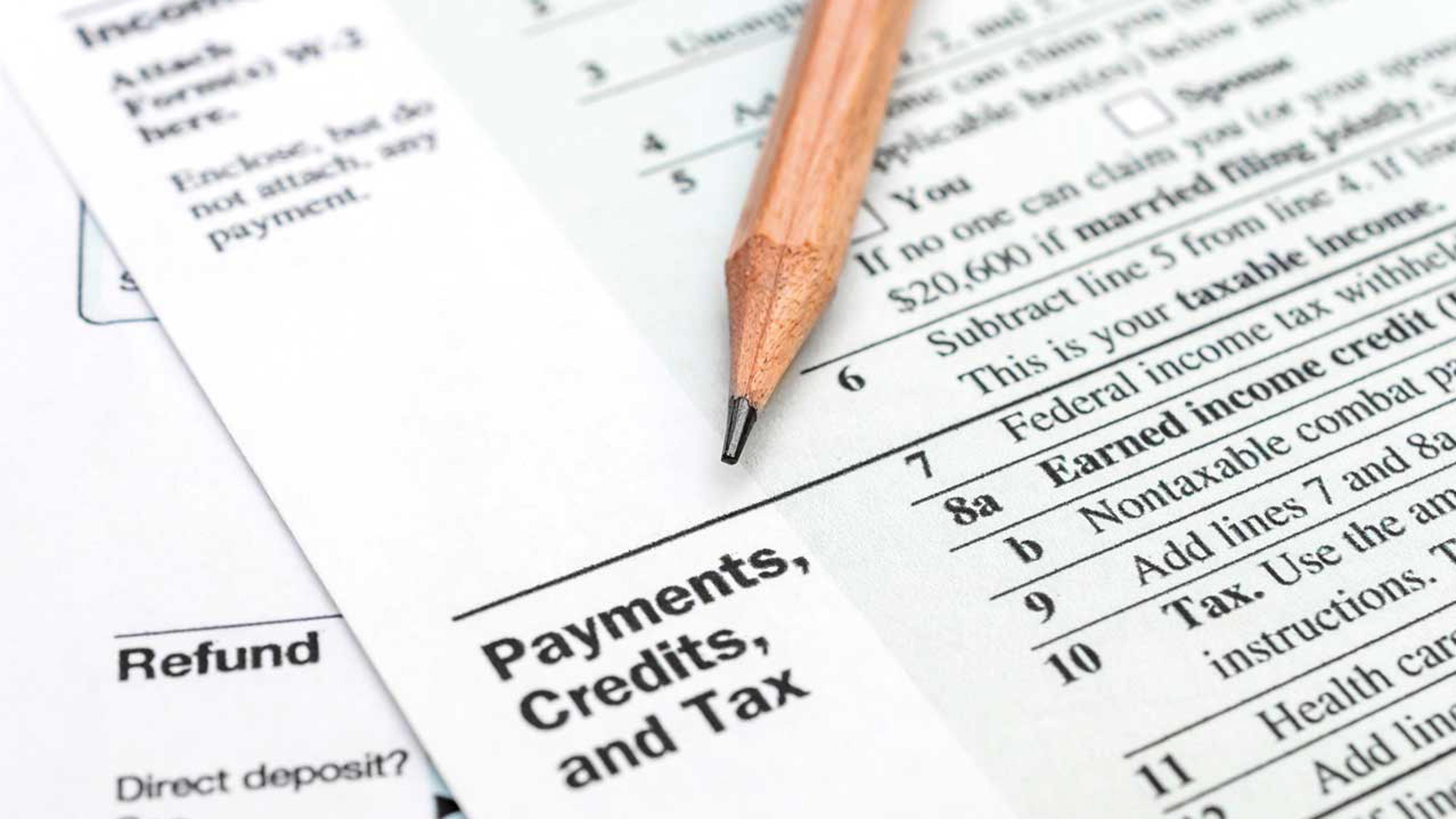10 New Year’s Financial To Do’s (You’ll Feel Great When You Check Them Off)
Once you run through this checklist, you’ll be in great shape for a prosperous and organized new year.


Profit and prosper with the best of Kiplinger's advice on investing, taxes, retirement, personal finance and much more. Delivered daily. Enter your email in the box and click Sign Me Up.
You are now subscribed
Your newsletter sign-up was successful
Want to add more newsletters?

Delivered daily
Kiplinger Today
Profit and prosper with the best of Kiplinger's advice on investing, taxes, retirement, personal finance and much more delivered daily. Smart money moves start here.

Sent five days a week
Kiplinger A Step Ahead
Get practical help to make better financial decisions in your everyday life, from spending to savings on top deals.

Delivered daily
Kiplinger Closing Bell
Get today's biggest financial and investing headlines delivered to your inbox every day the U.S. stock market is open.

Sent twice a week
Kiplinger Adviser Intel
Financial pros across the country share best practices and fresh tactics to preserve and grow your wealth.

Delivered weekly
Kiplinger Tax Tips
Trim your federal and state tax bills with practical tax-planning and tax-cutting strategies.

Sent twice a week
Kiplinger Retirement Tips
Your twice-a-week guide to planning and enjoying a financially secure and richly rewarding retirement

Sent bimonthly.
Kiplinger Adviser Angle
Insights for advisers, wealth managers and other financial professionals.

Sent twice a week
Kiplinger Investing Weekly
Your twice-a-week roundup of promising stocks, funds, companies and industries you should consider, ones you should avoid, and why.

Sent weekly for six weeks
Kiplinger Invest for Retirement
Your step-by-step six-part series on how to invest for retirement, from devising a successful strategy to exactly which investments to choose.
Most people are cautiously optimistic that 2021 will be a lot better than 2020. But while you're probably looking forward to a time when life can finally return to some semblance of normalcy, there are a number of steps you can take right now to make sure that your financial life is also in good order.

1. Adjust your withholding taxes if necessary
You may not get your 2020 Form W-2 wage and tax statements until the end of the month, but your last paycheck will give you a good idea of how much was withheld in taxes. If the figures are similar to what you earned in 2019, you might want to slightly reduce your withholding rates (if you received a large refund last year) or slightly increase them (if you ended up owing taxes). Your accountant can help figure out your “tax goldilocks zone.”

2. Increase your retirement plan contributions
Did you get an end-of-year bonus or raise? Consider using some of it to increase your contributions to your 401(k) plan. In 2021, you can contribute up to $19,500 in regular contributions plus $6,500 more in “catch-up” contributions if you’re 50 or older.
If your company doesn’t have a 401(k) plan, consider making a 2020 tax-year contribution of up to $6,000 (plus $1,000 if you’re 50 or older) to a traditional or Roth IRA. You have until April 15, 2021, to make this contribution for 2020. You can then make an additional contribution for 2021.

3. Review your investment performance – and adjust if needed
When you get your year-end investment statement, take a close look at how your portfolio performed as a whole and the returns for each account. Because the stock market did well last year, chances are that you may have more money invested in stocks (or stock funds) and less in bonds (or bond funds) than you originally intended. If so, consider readjusting your stock and bond holdings to your targeted balance by selling some stocks and reinvesting the proceeds into bonds.
Now, this can be a very complicated task to do on your own, particularly in a taxable account where you’re trying to minimize capital gains, which is why most people leave these decisions in the hands of an experienced investment adviser.

4. Get your tax deductions together
Your 2020 tax statements will dribble in gradually during January and early February, but you can get a head start by organizing all of your receipts for eligible deductible expenses and charitable contributions. Don’t forget to print out receipts for goods and services you purchased online.

5. ‘Cash out’ your Flexible Savings Account
If you have a flexible savings account (FSA) at work and haven’t depleted your 2020 funds, there may be hope. Your employer may offer a grace period of up to 2½ months in 2021 to use up leftover FSA balances from last year. And, if you still haven’t submitted claims for reimbursement of qualified costs that occurred in 2020, your employer may allow a “run out” period of up to 90 days to get your claims in.
If you’re struggling to find ways to use your leftover FSA funds, think about reducing your 2021 contributions if you’re still able to do so.

6. Review your credit history
The start of the year is a good time to check your credit score and make sure that no one has opened any credit card accounts in your name without your knowledge, especially if you plan on applying for a mortgage or home equity loan. All three of the main credit reporting agencies, Equifax, Experian and TransUnion, allow you to request one free credit report per year. Instead of asking for them all at once, considering staggering each individual request over the course of the year. You can request these credit reports online at Annualcreditreport.com.
And while you’re looking over your credit reports, consider closing credit card accounts you no longer use. The fewer you have, the less exposure you’ll have to potential credit card fraud.

7. Get your children’s financial aid applications done
If you’re counting on your college-age kids receiving financial aid for the 2021-22 academic year, complete their Free Application for Federal Student Aid (FAFSA) application (https://studentaid.gov) if they’re looking for federally funded direct student loans, or their CSS/Financial Aid Profile application (https://cssprofile.collegeboard.org/) if they wish to be considered for scholarships.

8. Document your end-of-life decisions
The COVID-19 pandemic has heightened the need for people of all ages to make sure they’ve documented their wishes should they become medically incapacitated. At the very least, assign someone you trust as a health care proxy who can make these decisions on your behalf and give someone financial power of attorney to handle your financial affairs. Also make sure that the beneficiaries for your retirement accounts and life insurance policies are up to date and that your will still reflects your wishes.

9. Protect your online security
Identity theft and online scams hit record-setting levels last year. Protect your online security by changing your online passwords to something that will be difficult for a hacker to figure out. Preferably, each should be a combination of capital and lower-case letters and numbers and special characters. And try to avoid using the same password on every site. If a hacker steals that password, they may be able to use it to access all of your online accounts.

10. Back up your data
If you can’t remember the last time you backed up your computer, now is the time to do it. If you don’t have the time or knowledge needed to do a full system backup, focus on saving your personal files to a flash drive, external hard drive or to the Cloud. If you have numerous photos and videos stored on your tablet or smartphone, back them to the Cloud (if available) or transfer them to your computer.
Obviously, there’s a lot of work involved in completing many of these tasks. If you don’t feel comfortable doing them on your own, ask for help and guidance from your financial adviser, accountant or attorney.
Profit and prosper with the best of Kiplinger's advice on investing, taxes, retirement, personal finance and much more. Delivered daily. Enter your email in the box and click Sign Me Up.

Dan Flanagan brings more than 25 years of financial planning, wealth management and accounting experience to his role as financial adviser Canby Financial Advisors. His investment, financial planning and tax experience has great appeal among the entrepreneurs and executives who are his typical clients. Securities and advisory services offered through Commonwealth Financial Network®, Member FINRA/SIPC, a Registered Investment Adviser.
-
 Nasdaq Leads a Rocky Risk-On Rally: Stock Market Today
Nasdaq Leads a Rocky Risk-On Rally: Stock Market TodayAnother worrying bout of late-session weakness couldn't take down the main equity indexes on Wednesday.
-
 Quiz: Do You Know How to Avoid the "Medigap Trap?"
Quiz: Do You Know How to Avoid the "Medigap Trap?"Quiz Test your basic knowledge of the "Medigap Trap" in our quick quiz.
-
 5 Top Tax-Efficient Mutual Funds for Smarter Investing
5 Top Tax-Efficient Mutual Funds for Smarter InvestingMutual funds are many things, but "tax-friendly" usually isn't one of them. These are the exceptions.
-
 Social Security Break-Even Math Is Helpful, But Don't Let It Dictate When You'll File
Social Security Break-Even Math Is Helpful, But Don't Let It Dictate When You'll FileYour Social Security break-even age tells you how long you'd need to live for delaying to pay off, but shouldn't be the sole basis for deciding when to claim.
-
 I'm an Opportunity Zone Pro: This Is How to Deliver Roth-Like Tax-Free Growth (Without Contribution Limits)
I'm an Opportunity Zone Pro: This Is How to Deliver Roth-Like Tax-Free Growth (Without Contribution Limits)Investors who combine Roth IRAs, the gold standard of tax-free savings, with qualified opportunity funds could enjoy decades of tax-free growth.
-
 One of the Most Powerful Wealth-Building Moves a Woman Can Make: A Midcareer Pivot
One of the Most Powerful Wealth-Building Moves a Woman Can Make: A Midcareer PivotIf it feels like you can't sustain what you're doing for the next 20 years, it's time for an honest look at what's draining you and what energizes you.
-
 I'm a Wealth Adviser Obsessed With Mahjong: Here Are 8 Ways It Can Teach Us How to Manage Our Money
I'm a Wealth Adviser Obsessed With Mahjong: Here Are 8 Ways It Can Teach Us How to Manage Our MoneyThis increasingly popular Chinese game can teach us not only how to help manage our money but also how important it is to connect with other people.
-
 Looking for a Financial Book That Won't Put Your Young Adult to Sleep? This One Makes 'Cents'
Looking for a Financial Book That Won't Put Your Young Adult to Sleep? This One Makes 'Cents'"Wealth Your Way" by Cosmo DeStefano offers a highly accessible guide for young adults and their parents on building wealth through simple, consistent habits.
-
 Global Uncertainty Has Investors Running Scared: This Is How Advisers Can Reassure Them
Global Uncertainty Has Investors Running Scared: This Is How Advisers Can Reassure ThemHow can advisers reassure clients nervous about their plans in an increasingly complex and rapidly changing world? This conversational framework provides the key.
-
 I'm a Real Estate Investing Pro: This Is How to Use 1031 Exchanges to Scale Up Your Real Estate Empire
I'm a Real Estate Investing Pro: This Is How to Use 1031 Exchanges to Scale Up Your Real Estate EmpireSmall rental properties can be excellent investments, but you can use 1031 exchanges to transition to commercial real estate for bigger wealth-building.
-
 Should You Jump on the Roth Conversion Bandwagon? A Financial Adviser Weighs In
Should You Jump on the Roth Conversion Bandwagon? A Financial Adviser Weighs InRoth conversions are all the rage, but what works well for one household can cause financial strain for another. This is what you should consider before moving ahead.
